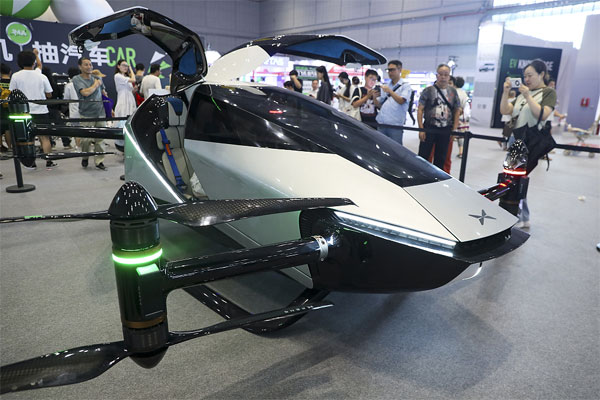Xpeng Aeroht makes great leap skyward
By Qiu Quanlin| Source: China Daily | Updated : 2024-11-04
Visitors take photos of the flying car developed by Xpeng Aeroht, which is affiliated with automaker Xpeng, at the China Intelligent Connected Vehicle Show and Automatic Driving Expo in Shanghai, Aug 9, 2024. [Photo/VCG]
Chinese carmaker Xpeng's aerial vehicle arm Xpeng Aeroht has begun construction of a manufacturing base for its modular flying cars in Guangzhou, Guangdong province, taking a lead worldwide to leverage an assembly line for large-scale production of such aerial vehicles.
The plant will produce Land Aircraft Carrier models with a projected annual capacity of 10,000 units, the company said.
"The manufacturing base will prioritize environmentally friendly production and artificial intelligence, and establish a global benchmark for flying car production," said Zhao Deli, founder of Xpeng Aeroht.
The facility in Guangzhou will cover an initial footprint of some 180,000 square meters and incorporates four major workshops of composites: joint fitting, painting, assembling and other support infrastructure.
"The new factory design integrates workshops and centralized logistics in a streamlined and compact layout, reducing waste in storage and transportation while enhancing production efficiency," Zhao said.
The company said the new production line will employ a comprehensive traceability system that ensures compliance with strict aviation safety standards, tracking each component from the supply chain to final assembly.
Additionally, the plant will implement solar power generation across its facilities, employ energy-saving equipment in high-energy areas, and utilize a digital energy management system for real-time monitoring, significantly lowering its carbon footprint.
The modular flying car has ground and air modules which can autonomously separate and combine. The air module facilitates vertical takeoff for low-altitude flights, while the ground module ingeniously envelops the air module, allowing for ground transportation, according to the company.
The establishment of the flying car production facility plays an important role in Guangzhou's advancement in the low-altitude economy sector, said Shao Jingbo, deputy director of Guangzhou Development District's administrative committee.
An action plan for promoting the high-quality development of the low-altitude economy in Guangdong proposes to build a world-leading low-altitude economy hub in the province within three years, with the economic scale exceeding 300 billion yuan ($41.4 billion) by 2026.
Guangdong will nurture a number of leading enterprises and specialized innovative companies in the low-altitude economy by supporting the development of the industry through government investment funds and establishing special funds through market-oriented approaches to guide more funds into key areas of the low-altitude economy, according to the plan, which was announced earlier this year.
Guangzhou will closely collaborate with Xpeng Aeroht to drive the flying car industry forward, reaching new heights and expanding the industry's impact on national economic growth, Shao said.
Xpeng Aeroht recently completed an inaugural manned test flight of the air module. The modular flying car is scheduled for its global public flight debut at Airshow China, which is scheduled in November in Zhuhai, Guangdong, with presales beginning by the end of the year.
Qiu Mingquan, vice-president of Xpeng Aeroht, said earlier that the true arrival of flying cars in urban air mobility might take some time.
"But the modular flying car targeting individual users will be able to fly in the next five years because the land module can be driven and the air module can fly in some specific areas," said Qiu.
- Investment and Entrepreneurship
- Investment Advantages
- Investment Guide
- Policies
- Key Projects
- Major Industries
- Industrial Parks
- Investment Opportunities
- Technological Innovation
- IPR
- Enterprises
- Talents
All rights reserved. Presented by China Daily
粤ICP备16087157号-1










